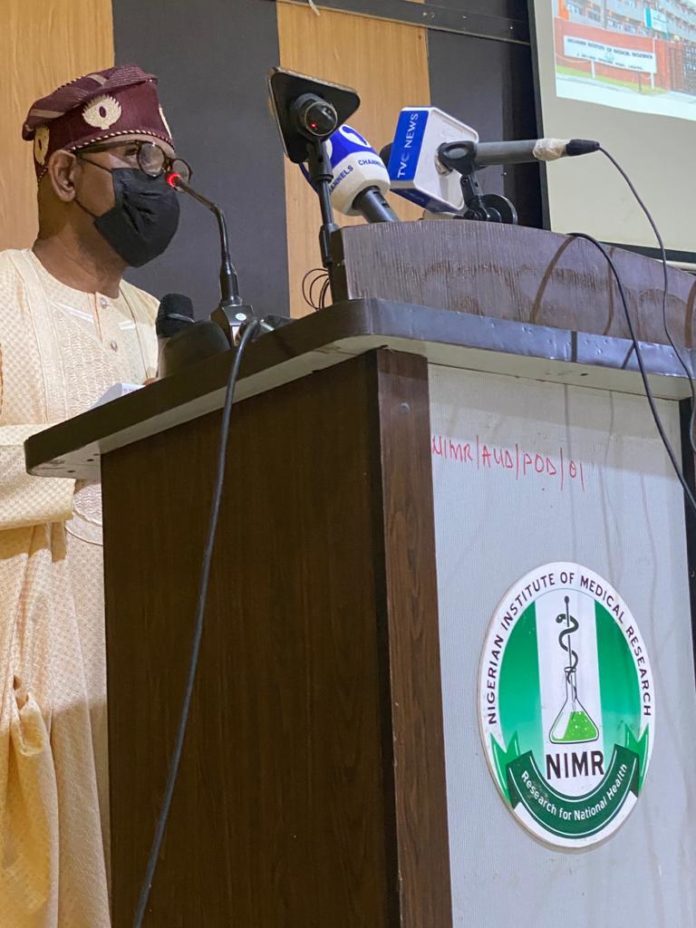The Honourable Minister of State for Health, Dr. Olorunnimbe Mamora has stated that the Nigeria Institute of Medical Research (NIMR) has continued to make great impact in the promotion of health research in the country, putting Nigeria in the frontier of research in the global map.
Dr. Mamora made this statement while launching an indigenous Lassa and Yellow Fever Diagnostic Kit as well as commissioning of a Drug Discovery and Toxicology Laboratory; a Food Safety Laboratory and an E-library/Administrative block at the Nigeria Institute of Medical Research Yaba, Lagos State.
The Minister of State revealed that Lassa and Yellow fever viruses are two pathogens of public health concern in Nigeria, which exhibits sporadic outbreaks resulting in many casualties recorded over the years. The lack of effective tools for the diagnosis of these diseases in Nigeria has led to their misdiagnosis, as their presentation could mimic other febrile illnesses such as malaria and typhoid. “You cannot treat effectively what you do not know, even as a clinician when you make your clinical diagnosis you will still necessarily go further to do laboratory diagnosis. Outcomes of prognosis of any disease are early diagnosis and prompt treatment he stated.”
According to him, diagnostic tools are not accessible to the majority of healthcare centres across the country, due largely to the high cost of purchase and delivery. Hence the need for the development of an in country readily available, accessible, low cost, sensitive, specific and reliable effective diagnostic tools. “NIMR should therefore be commended for the initiative of developing this indigenous test kit that will go a long way in improving health care delivery to the people of Nigeria.”
Dr. Mamora went further to say that the commissioning of the Medical E-Library which serves as an easily accessible reservoir of knowledge for research and houses the administrative power of the institution, completely shows a working system that we are proud of, in addition to the Drug Discovery and Toxicology Laboratory and the Food Safety Laboratory. The above project the Minister said, will significantly aid and facilitate scientific communication and collaboration among researchers especially in the health sector and also further protect and strengthen health research in general.

”The government and people of Nigeria will continue to look up to institutions like NIMR to drive the required break through that will propel the country to reduce the existing gaps in research and development with the view of catching up with the rest of the world.”
The Permanent Secretary, Federal Ministry of Health, Mr. Mahmuda Mamman who was represented by Pharm. Olubukola Ajayi, the Director Food and Drug Services in the Ministry disclosed that the Federal Government will continue to promote and provide an enabling environment for research and development practice in line with global best practices towards the attainment of desirable healthcare for the country.
She said that the FMoH is committed to providing quality healthcare to everyone towards the achievement of Universal Health Coverage (UHC) across the country according to the resolutions of Sustainable Development Goals (SDGs). The FMoH has prioritized the upgrading and strengthening of its institutions to be prepared to provide the desirable services in the face of the global health challenges.
These new state-of-art facilities will contribute towards the provision of quality healthcare service delivery that would curb medical tourism to other countries with the needless loss of capital flight of foreign exchange out of the country.
Earlier, the Director General NIMR, Prof. Babatunde Salako in his welcome address informed that in the last one year, NIMR has made significant contributions in the fight against COVID-19 pandemic, by inventing among other things two COVID-19 Molecular diagnostic test kits which have been duly presented to the public. However Nigeria continues to experience regular outbreaks of Lassa and Yellow Fever even during COVID-19 pandemic causing enormous morbidity and mortality among our population. In order to make case detection of these diseases easy and timely, our researchers have once again developed home grown diagnostic kits for both diseases, this kits have been initially validated in house and also by the center for Zoonosis and Human Virology of the College of Medicine, University of Lagos.
He revealed that the NIMR YELLOW FEVER VIRUS RT-qPCR KIT is for the detection of the Yellow fever virus. It operates on the principle of Real Time Polymerase chain reaction in the detection of the Yellow Fever Virus with the primary target which detects the presence of the Yellow Fever Virus on the FAM Channel and an Internal Control on a ROX Channel. It has a Sensitivity and Specificity of 84%and 100% respectively as it continues to undergo vigorous validation to meet up with the WHO standard. This assay produces results in 67 minutes.

While the LASSA FEVER VIRUS RT-qPCR KIT is a kit developed for the detection of the Lassa fever virus. This Assay operates on the principle of Real Time Polymerase chain reaction in the detection of the Lassa Fever Virus. It detects the S-gene of the Lassa Fever Virus with two targets; the primary target detects the presence of the Lassa Fever Virus on the HEX/VIC Channel and an Internal Control on a ROX Channel. It has a Sensitivity and Specificity of 72% and 100% respectively as it continues to undergo vigorous validation to meet up with the WHO standard. This assay produces results in 67 minutes.
Speaking further, the DG disclosed that as part of its mandate, under the enabling Act of 1977, to conducts research into diseases of Public Health importance in Nigeria, the institute deemed it fit to establish two laboratories which will adequately support research and improve the standard of healthcare services in the area of drug discovery and toxicology and food safety.
The Toxicology laboratory he said, boasts of two newly installed equipment and other accessories ATOMIC EMISSION SPECTROSCOPY Equipment (The Agilent 5800 ICP-AES) and GAS CHROMATOGRAPHY-MASS SPECTROSCOPY INSTRUMENTS (Agilent 5977B). These together form the long-awaited technological capacity and platform for drug discovery, design, development and quality control, food and natural products analysis, cancer and infectious diseases research. These equipment are also capable of supporting detection of drug and drug levels in the system of those who use drug or abuse.
The Food Safety laboratory also houses two newly acquired equipment VIDAS and TEMPO with other accessories and reagents capable of screening for and detecting food pathogens in processed food etc.
VIDAS which is the Vitek Immunoassay Diagnostic Assay System is mainly used for detection of pathogen and toxins in foods. This includes: Salmonella, Listeriaspp, Escherichia coli 0157:H7, Campylobacter and Staphylococcal enterotoxins. The technology used is adaptable to a wide range of assays including serology, immunochemistry, antigen detection, industrial microbiology and immunohemostasis.
TEMPO on the other hand is used for the enumeration of quality indicator organisms in food and environmental samples. It automates food safety testing for total viable counts, coliform counts, genericE. coli, and Enterobacteriaceae, lactic acid bacteria (LAB), Staphylococcus aureus, yeasts and molds, Bacillus cereus and Campylobacter spp. Food safety is integral to the Sustainable Development Goals because when food is not safe, human development cannot take place and food security cannot be achieved (FAO, 2019). Nigeria has a large and growing population whose need for safe food cannot be over emphasized. Hence the need to set up a Food Safety Laboratory of ISO certification standard that will enhance food borne disease outbreak surveillance in the country, he stated.
According to Prof. Salako, the E-Library/Administrative Building will host Server for data for COVID -19 and other hemorrhagic fevers and the platform for genomic data analysis and other research projects. “NIMR E-library will take important steps to preserve the integrity of research conducted by scholars in the Institute and improve access that the research community has to digital resources.
It will change the outlook of the library to a ‘Knowledge Centers’ with priority on value-added electronic information services that will continue to enhance the academic and research focus of our institution.”
With these Laboratories, our nation is once again well positioned for technological advancement, Research and Development of global standard and relevance. This, without doubt, will enhance our capacity to better respond to outbreaks, hasten elimination of diseases and raise Life expectancy of our people.
By Blessing Efem
Signed: Olusegun Adetola
Head (Media & Public Relations)






